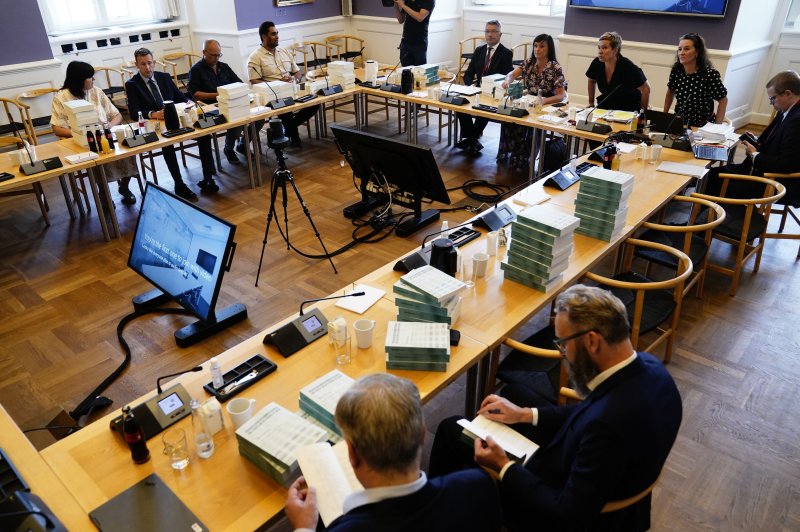Members of the Committee of Inquiry receive the report produced by the so-called "Mink Commission" at the Danish Parliament in Copenhagen, Denmark, on Thursday. Photo by Mads Claus Rasmussen/EPA-EFE
June 30 (UPI) -- A Danish parliamentary committee released a report Thursday accusing the government of making "grossly misleading" statements in the early months of the COVID-19 pandemic when ordering the country's mink population to be culled.
The report took particular issue with Danish Prime Minister Mette Frederiksen, saying her order to slaughter millions of mink in November 2020 broke the law. The commission, though, said she wasn't aware the order was illegal.
Frederiksen announced the culling in November 2020 based on evidence showing animals had developed a mutated version of the coronavirus capable of infecting humans. The government said the mutation may have degraded the effectiveness of any vaccines scientists developed to combat the virus.
Denmark, the largest producer of mink fur, had between 15 million and 17 million of the rodents, and the armed forces were deployed to the 1,500 mink farms to perform the culling. The order required farmers to slaughter both healthy and infected mink to prevent the spread of the mutated virus.
The parliamentary report, though, said there was no legal framework in place to carry out the culling.
The Danish government offered the farmers compensation for the decision, which effectively ended the country's mink fur production. The report said the compensation program will likely cost taxpayers between $1.89 billion and $2.3 billion dollars.
Farmer Martin Merrild told The Guardian he lost his entire business overnight.
"It was close to the skinning season, so we could have reduced the population and just kept a small breeding population for the following year, which could then have been vaccinated. But they ignored the normal processes of consulting with industry that we have in Denmark," he said.
"I don't think they even knew how big an industry we had in Denmark. They thought it was a small niche and had no idea the decision would cost taxpayers billions."
Frederiksen's decision was met with backlash across the country and led to the resignation of Agriculture Minister Mogens Jensen, the BBC reported.
The report recommended disciplinary action for 10 top civil servants, including Danish police head Thorkild Fogde, for allegedly failing to react when learning there was no legal framework for the cull.















